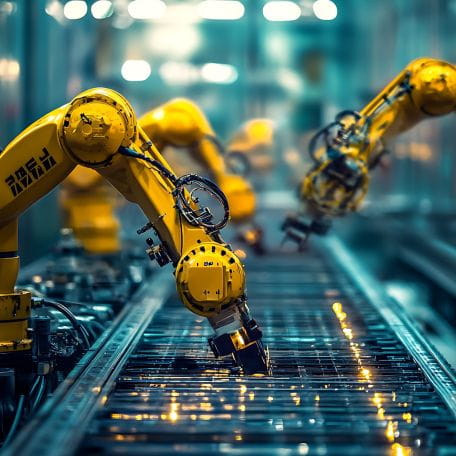On New Year’s Eve in 1879 in Menlo Park, a tiny village of only 12 houses and 20 miles north of New York City, an intrigued crowd of businesspeople, newspaper reporters, friends and family gathered as Thomas Edison unveiled the modern incandescent electric lightbulb to the world. To everybody’s amazement, from on top of a row of wooden lampposts, Edison’s bulbs illuminated Christie Street outside his lab with the world’s first “artificial light”.
What Edison was really introducing, however, was something much bigger: a once in a generation ‘general purpose technology’. In the decades that followed, electricity penetrated every sector of the US economy, driving previously unseen rates of productivity growth in manufacturing, enabling the scaling up of major industries such as automobiles and aviation, and the creation of brand-new industries such as the telephone, radio, television, and the rise of Hollywood. Moreover, electricity eventually revolutionised home productivity through domestic appliances such as the washing machine affecting lives immeasurably beyond the realms of work. Economist Paul David calculates that productivity growth in US manufacturing accelerated from around 1.5% a year before electricity to nearly 3% a year during the following decades.
We believe that just like electricity, artificial intelligence (AI) is a ‘general purpose technology’ that will impact every dollar of GDP, drive productivity, better science and innovation, and create new industries. It will also severely disrupt companies on the wrong side of this.
The opportunities are everywhere. Mckinsey estimates that generative AI could ultimately add between $2.6 trillion and $4.4 trillion a year to the global economy, while Goldman Sachs believes it could increase annual global GDP by 7%. Although the projections of how much generative AI will increase productivity vary (with some forecasting as much as a 14% global GDP boost by 2030), the direction and significance of the uplift is widely accepted. Crucially, we believe AI has the potential to enable certain companies to both create and capture value, key requirements for the potential of innovation to drive stock returns.
Speed of transformation
What is different from electricity is that the transformation is going to happen a lot quicker with AI. The payback period for installing electricity in a factory in the US in 1900 was five years. Compare this to installing Microsoft Copilot today in an office: the payback period is one and a half days. This is why substantial investment is taking place now.
Eighteen months ago, ChatGPT set in motion the biggest infrastructure buildout we might ever see. The four big technology companies – Microsoft, Google, Amazon and Meta – are going to spend around $200 billion this year in capital expenditure on infrastructure for AI. This is about the size of the Greek economy and is 37% more than last year. And it is 50% higher than the average capital expenditure intensity.
The return on investment (ROI) is already visible today and will grow over time. We believe AI will drive strong earnings growth for the companies that can take advantage of it. One example is Microsoft, which saw 7% acceleration year-on-year in the first quarter of 2024 for its cloud business.
Another example over the past couple of years is Meta, formerly Facebook. At the end of 2022, Meta was facing a huge threat from TikTok with no real answer. In that year, Meta saw its revenues shrink 5%. This was shocking for a company that over the previous five years had generated 35% annualised revenue growth. The P/E ratio for Meta in 2022 was eight times.
What did CEO Mark Zuckerberg do in 2022? He started building out its AI capabilities, buying Nvidia GPUs (graphic processing units) at a great rate. Eighteen months later, 50% of Instagram's content has been curated in a specialised way for users by AI. Meta has seen revenue growth over the last 12 months reaccelerate back to 20%. The company is enjoying a rejuvenation of the business at the same time as costs are coming down, including headcount falling by between 20% and 25%. Revenues per worker have risen from $1.3 million in 2022 to $2 million today.
Value creation
AI will play a central role in innovation’s ability to make things cheaper and make more and better from less over the coming years. Take healthcare as an example, a sector that accounts for around 20% of the US economy and is notoriously dogged by inefficiencies and high costs. Over 90% of research and development (R&D) for drugs fails. Companies such as Moderna, focused on mRNA-based drug discovery, and Salt Lake City-based and Nvidia-backed Recursion, focused on machine learning driven drug discovery, are using AI to raise the productivity of R&D and lower the cost and speed up the process of drug discovery. As the largest health insurer and manager of health care in the US, United Health is using AI to lower drug and treatment prices and raise the quality of outcomes.
Value capture
Innovation can enable companies to build formidable barriers, driving profitability. The key question for AI and value capture is whether it will prove to level the playing field between the best companies and the rest or enable the best to accelerate further ahead. We strongly believe that while many, if not most, companies will become more productive through AI, the biggest gains by far will be reaped by the best companies, strengthening barriers to competition and profitability. There are three reasons for this.
First, AI will likely exhibit increasing returns to scale because efficacy thrives above all on learning from data and experience. For this reason, we have investments in leaders in their niches with significant scale and data advantages, such as Airbnb, Spotify and Uber. Second, even if everyone had the same data, they would not all use it. We agree with economic historians such as Nick Crafts who view AI in the historical lineage of general purpose technologies – major innovations such as steam, electricity and personal computers that impact most sectors of the economy and give rise to powerful ripples of many further, smaller and more specific innovations. Third, AI is not just a significant innovation, but a tool for innovation itself. This will favour the competitive advantage of innovative companies, boosting the productivity of their innovative efforts relative to their peers.
Investment opportunities
Across the new technology stack, from infrastructure companies such as Nvidia providing the chips and software foundations, through LLMs becoming the new AI “brain”, to ServiceNow building AI tools for companies across the whole economy, we are focused on investing in businesses that are building and harnessing AI tools to drive productivity. We are also invested in leading innovators such as Spotify and Netflix, where AI meets the public, enhancing the customer experience. We believe the strongest growth and shareholder returns will ultimately accrue to companies that fully commit to AI-based reorganisation.
While risks exist around factors such as regulation, bias and job losses, AI’s economic promise outweighs the pitfalls, especially if governance keeps pace. We believe the next decade will be defined by the rise of AI across the economy.
To read the Liontrust Global Innovation team’s new report on AI, click here.
KEY RISKS
Past performance is not a guide to future performance. The value of an investment and the income generated from it can fall as well as rise and is not guaranteed. You may get back less than you originally invested.
The issue of units/shares in Liontrust Funds may be subject to an initial charge, which will have an impact on the realisable value of the investment, particularly in the short term. Investments should always be considered as long term.
The Funds managed by the Global Innovation Team:
May hold overseas investments that may carry a higher currency risk. They are valued by reference to their local currency which may move up or down when compared to the currency of a Fund. May have a concentrated portfolio, i.e. hold a limited number of investments. If one of these investments falls in value this can have a greater impact on a Fund's value than if it held a larger number of investments. May encounter liquidity constraints from time to time. The spread between the price you buy and sell shares will reflect the less liquid nature of the underlying holdings. Outside of normal conditions, may hold higher levels of cash which may be deposited with several credit counterparties (e.g. international banks). A credit risk arises should one or more of these counterparties be unable to return the deposited cash. May be exposed to Counterparty Risk: any derivative contract, including FX hedging, may be at risk if the counterparty fails. Do not guarantee a level of income.
The risks detailed above are reflective of the full range of Funds managed by the Global Innovation Team and not all of the risks listed are applicable to each individual Fund. For the risks associated with an individual Fund, please refer to its Key Investor Information Document (KIID)/PRIIP KID.
DISCLAIMER
This is a marketing communication. Before making an investment, you should read the relevant Prospectus and the Key Investor Information Document (KIID), which provide full product details including investment charges and risks. These documents can be obtained, free of charge, from www.liontrust.co.uk or direct from Liontrust. Always research your own investments. If you are not a professional investor please consult a regulated financial adviser regarding the suitability of such an investment for you and your personal circumstances.
This should not be construed as advice for investment in any product or security mentioned, an offer to buy or sell units/shares of Funds mentioned, or a solicitation to purchase securities in any company or investment product. Examples of stocks are provided for general information only to demonstrate our investment philosophy. The investment being promoted is for units in a fund, not directly in the underlying assets. It contains information and analysis that is believed to be accurate at the time of publication, but is subject to change without notice.











